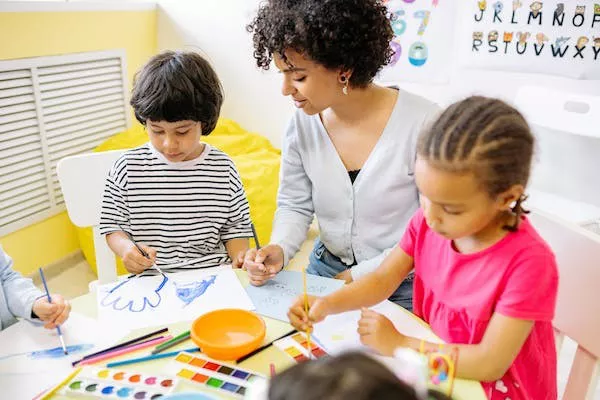Preschool teachers play a pivotal role in shaping the foundation of a child’s educational journey. Their responsibilities extend far beyond simple caretaking; they are entrusted with nurturing young minds during a critical period of development. In this comprehensive exploration, we delve into the multifaceted world of preschool teaching, shedding light on the essential tasks, skills, and strategies that make these educators indispensable in fostering the holistic growth of our youngest learners.
Creating a Nurturing Environment
One of the primary responsibilities of preschool teachers is to establish an environment that is conducive to learning and growth. This involves creating a warm and welcoming atmosphere that encourages children to explore, discover, and engage with their surroundings. Preschool classrooms are carefully designed to stimulate curiosity, with colorful displays, age-appropriate toys, and designated spaces for various activities.
In addition to physical spaces, teachers also focus on fostering positive social and emotional environments. They help children develop essential social skills such as sharing, taking turns, and resolving conflicts. Preschool teachers are adept at recognizing and addressing the unique emotional needs of each child, creating a safe and supportive space for emotional expression and development.
Designing and Implementing Curriculum
Preschool teachers are instrumental in designing and implementing age-appropriate curriculum that caters to the developmental needs of their students. These curricula are not only academically focused but also encompass various aspects of a child’s growth, including motor skills, language development, and social interactions.
Curriculum planning involves selecting activities and lessons that align with educational standards while also catering to the individual needs and interests of the children. From art projects to storytelling sessions, preschool teachers employ a diverse range of teaching methods to ensure that learning is both enjoyable and effective.
Fostering Language and Cognitive Development
Language and cognitive development are critical aspects of early childhood education. Preschool teachers actively engage children in activities that promote language acquisition, vocabulary expansion, and cognitive skills. Storytime, rhyming games, and interactive discussions are just a few examples of the strategies used to enhance language development.
Cognitive development is nurtured through activities that stimulate critical thinking, problem-solving, and creativity. Teachers incorporate games, puzzles, and hands-on experiences to encourage children to explore and understand the world around them. These activities not only lay the groundwork for academic success but also cultivate a love for learning.
Individualized Instruction and Assessment
Recognizing that each child is unique, preschool teachers implement individualized instruction to meet the diverse needs of their students. They assess the developmental progress of each child and tailor their teaching strategies accordingly. This personalized approach ensures that children receive the support and challenges they need to thrive.
Assessment in preschool settings is often informal and observation-based. Teachers keenly observe children’s interactions, behavior, and engagement in activities to gauge their development. This ongoing assessment informs instructional decisions, allowing teachers to adapt their methods and address emerging needs.
Cultivating Social and Emotional Skills
Beyond academic knowledge, preschool teachers play a crucial role in nurturing the social and emotional skills that form the foundation for future success. They create opportunities for children to interact with their peers, fostering the development of communication, cooperation, and empathy.
Conflict resolution is a key component of social and emotional learning in preschool. Teachers guide children through the process of resolving conflicts peacefully, teaching valuable skills that contribute to positive interpersonal relationships. These early lessons in emotional intelligence lay the groundwork for future social success.
Collaboration with Families
Effective communication and collaboration with families are essential components of a preschool teacher’s role. Teachers regularly share insights into a child’s progress, achievements, and areas for growth with parents or guardians. This collaborative approach ensures a consistent and supportive learning environment both at home and in the classroom.
Family involvement extends beyond simple updates; teachers often organize events, workshops, and parent-teacher conferences to strengthen the partnership between home and school. This collaborative effort enhances the overall development of the child and reinforces the importance of a united front in supporting their education.
Promoting Health and Safety
Preschool teachers are responsible for maintaining a safe and healthy environment for their students. This involves implementing safety protocols, monitoring hygiene practices, and ensuring that the physical space is conducive to the well-being of young children. Teachers also educate children on essential health habits, such as hand-washing and proper nutrition, instilling lifelong habits that contribute to overall well-being.
In addition to physical health, teachers are attuned to the emotional well-being of their students. They create a supportive atmosphere where children feel secure, fostering a sense of trust that is crucial for their emotional development.
Professional Development and Continuous Learning
The field of early childhood education is dynamic, with ongoing research and evolving best practices. Preschool teachers engage in continuous professional development to stay abreast of the latest trends, methodologies, and educational theories. This commitment to lifelong learning ensures that teachers remain effective and innovative in their approaches to early childhood education.
Professional development opportunities may include workshops, conferences, and advanced education courses. These experiences not only benefit teachers individually but also contribute to the overall advancement of early childhood education as a field.
Advocacy for Early Childhood Education
Preschool teachers often find themselves advocating for the importance of early childhood education in society. They play a crucial role in raising awareness about the impact of quality early education on a child’s overall development and future success. Advocacy efforts may involve engaging with policymakers, participating in community events, and educating the public about the value of investing in early childhood education.
Conclusion
In the intricate tapestry of early childhood education, preschool teachers stand as the weavers, crafting an environment where young minds can flourish. Their multifaceted role encompasses not only academic instruction but also the cultivation of social, emotional, and cognitive skills. As we appreciate the vital contributions of preschool teachers, it becomes evident that they are architects of the future, shaping the trajectory of a child’s educational journey and laying the groundwork for a lifetime of learning.


